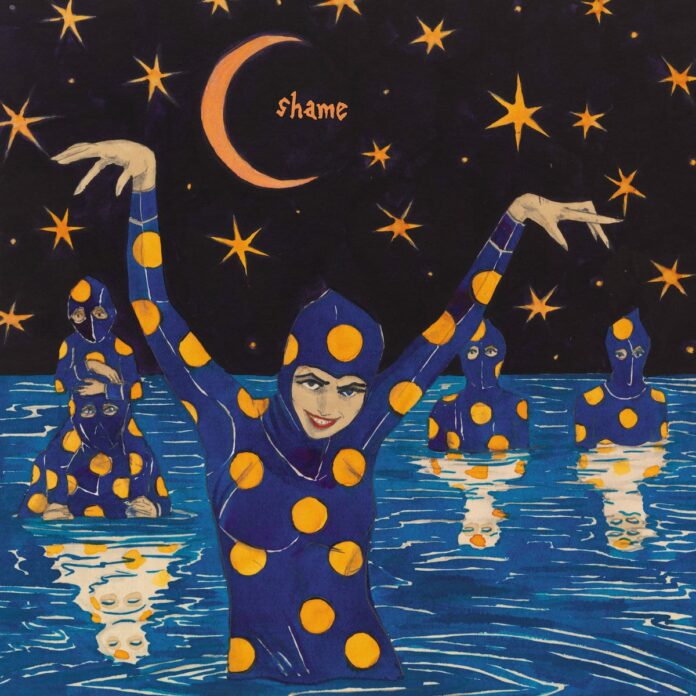Single-word band names have a way of staring you right in the face. Black Country, New Road, black midi, Dry Cleaning – these are all interesting names that make you ponder what they’re all about. But shame you feel in the pit of your stomach. And though the band has a penchant for reinventing itself with each album, intense feelings around worry, guilt, and frustration still sit at the heart of their music. On their new LP, Food for Worms, however, they don’t fester under the surface as much, instead pouring out in different directions. “I don’t think you can be in your own head forever,” frontman Charlie Steen remarked in press materials, which explains their shift away from the suffocating introspection of 2021’s Drunk Tank Pink. But Shame also wished to avoid writing about other all-too-common subjects in popular music, which Steen points out “is always about love, heartbreak, or yourself. There isn’t much about your mates.”
A staggering step forward, Food for Worms revolves around friendship in ways that highlight the band’s unique personality as well as their sonic evolution. Even if less frequently addressed, that theme is still broadly familiar, and the album finds new ways of wringing emotion out of it; those tangled feelings are often directed at others rather than the self, but they still come in many forms. To reflect this, the band adopts a focused, deceptively simple approach that never lacks in dimensionality. Their main goal may have been to unknot the headier trappings of Drunk Tank Pink, but it also works to shed away the emotional detachment that their debut (and post-punk in general) can be overly reliant on. Steen hired a vocal coach who helped him overcome the “very male tendency” of delivering a potent or melodically precise performance by defusing vulnerability; guitarist Sean Coyle-Smith felt similarly compelled to reassess everything he knew about how to play the guitar. Confronting their own dissatisfaction has not only revitalized the band’s sound but pushed it outward, resulting in some of their most evocative and communal songs to date.
‘Fingers of Steel’ opens the record by introducing its prevailing theme: “You know you’re wasting away/ There’s a sun outside but you don’t see it,” Steen sings to an estranged friend, aggravated by their relentless complaining but empathetic towards their general sense of disaffection – no matter its source or particular expression, it’s one that echoes throughout Food for Worms. Rather than conjuring the scorched intensity a band like Squid is known for, however, they infuse the song with the kind of warmth that tilts its weight toward understanding; Coyle-Smith’s solo stops itself just short of an explosion. On ‘Adderall’, Steen becomes a helpless observer to a friend addicted to prescription drugs, and the song clings to a simple but anthemic chorus that casts a huge shadow.
Shame don’t abandon all of their old musical tendencies, but they give them the space to either draw out or mutate. ‘Six-Pack’ brings a new dynamism to the claustrophobia of Drunk Tank Pink by switching from frantic wah-wah guitars to a looser, more ominous structure. With ‘Yankees’ comes a shift in tone – “You bring me down/ And that is love, so you say” – but Steen’s resentment is steeped in feeling that might have otherwise been dimmed out, while Coyle-Smith offers another clean, nicely mapped-out guitar solo that offsets the thickness of the overall production. That resentment doesn’t really bubble over until ‘Orchid’, which starts out in the affecting, laid-back mode of ‘Adderrall’. Coyle-Smith subtly paints over a gentle acoustic groove as Steen sings of “a palette of colours that you’ve never seen,” before, in its fifth and final minute, the song spirals off into a furious conclusion. The band have always kept their cathartic moments relatively brief, but rarely have they felt so necessary.
Still, it’s not enough to resolve the conflict that divides so much of Food for Worms. On ‘Burn by Design’, Steen considers the difference between selling yourself and burning (out) for a cause; on ‘Different Person’, he struggles to understand someone who’s “still the same to me even though you speak with a different accent now for fun.” Though we think of shame as an internal, self-perpetuating process, it can be part of the whirlwind of emotions that come with watching people drift away. How do you know you’re justified in your attitude towards them, positive or negative? Do you paint them as victims or agents of their own demise? The band may not have an answer, but they know better than to pretend to be above it all, striking a delicate balance. And at the end of the album, they take a long, hard look at themselves – and ahead. “All the people that you’re gonna meet/ Don’t you throw it all away/ Because you can’t love yourself,” they sing in unison. It might be in the group’s name, but they won’t let shame be the thing that defines them.

